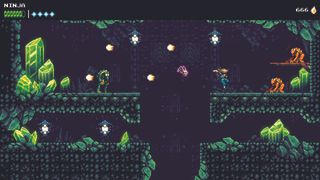In praise of games that get New Game Plus right
Some games are so good you have to play them twice.

New Game plus (styled as "New Game+" or "NG+") typically allows players to begin a game all over again, retaining a significant amount of unlocks and potentially gaining new insight into a game’s world through added features. it allows developers to extend potential game time using existing content and the addition of this mode in the many forms it can take seems to be popular—so why aren’t more developers doing it?
"It’s important to understand that ‘the same but different’ is actually ‘different, but some things might be the same’," says Spearhead Games senior designer Graeme Lennon. "It’s rarely as simple as tweaking some numbers for a harder NG+. Wave timings, hit counts, heal rates, etc, all interact and all need to be tested." After the success of Spearhead Games’ debut game, Stories: The Path of Destinies, they built their second game Omensight entirely around the concept of exploring branches and loops. This ultimately took the form of a supernatural action murder mystery.
"Because our game has you revisiting many of the same spaces, with different characters, in different contexts, with different events, it did become really complicated to layer all of the scripting and design elements on top of each other," Lennon says. "Doing it again I’d have implemented things differently, but isn’t that true about every game?" Speaking to other developers experimenting with similar content, the complexity Lennon encountered is not unusual. The developers of State of Decay 2 encountered problems that are almost the polar opposite, for not just New Game+, but linear content in general.

In State of Decay 2, New Game+ lets players take characters that survive the final mission and use them in another playthrough of the open-world survival game to build a new set of communities. "Rather than having a single story, our game is designed to tell multiple stories about multiple communities, all living in the same apocalyptic world," State of Decay 2 software engineer Jørgen Tjernø tells me. "We wanted our game to be able to generate new characters and stories endlessly, as players started community after community. That meant we needed to build up a really intricate character generator, and an extremely flexible mission system that could create new characters and stories out of whatever raw materials the players provided. There’s a good reason why most games don’t try this."
Tjernø elaborated, "Most games have tools that are designed to make scripted events happen under very specific conditions, and introducing dynamic elements is a weird, disruptive challenge. We had the opposite problem. We built our tools entirely around supporting dynamic content and arbitrary player behaviour, so at the few times when we actually needed to make something very specific happen, it was an elaborate process to get the tools to do it at all."
Second playthrough

Technical action game Lucah: Born of a Dream follows the mold of games like Nier: Automata and makes the player’s evolving prowess a critical part of the story that unfolds over two playthroughs. The dynamic knowledge and translation systems in Inkle’s narrative archaeology game Heaven’s Vault combine for the New Game+ versions of transcription puzzles to always be new, and get increasingly specific over time, ensuring players are constantly learning more about the world they’ve chosen to keep engaging with.
Thierry Boulanger of platforming adventure The Messenger tells me how the team’s approach to New Game+ changed the dynamic of the entire game, "The player gets to pick an additional item to lock-in from the get go, making the second portion of the game shorter every time. By something like NG+14, you have nothing left to fetch in the world so the whole adventure is a linear path to the final boss, but everything also kills in one hit by that point, and the fee to get resurrected is so high that touching anything probably means perma-death. In this way our NG+ becomes a meta-game of how far you can make it, with dynamically increasing difficulty and a trackable highscore."
The biggest gaming news, reviews and hardware deals
Keep up to date with the most important stories and the best deals, as picked by the PC Gamer team.
Reading the answers sent in from these developers, and others behind games including Minit, and Artisan: Going Home Again, my view of New Game+ changed substantially. New Game+ isn’t developed as an afterthought—it’s developed around.
It’s as fundamental a part of the game as the first playthrough, with even less of a guarantee of being seen by the majority of its audience.
Most Popular

